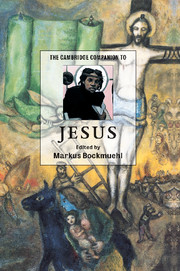Book contents
- Frontmatter
- Introduction
- Part I The Jesus of history
- Part II The History of Jesus
- 8 Sources and methods
- 9 Quests for the historical Jesus
- 10 The quest for the real Jesus
- 11 Many gospels, one Jesus?
- 12 The Christ of the Old and New Testaments
- 13 Jesus in Christian doctrine
- 14 A history of faith in Jesus
- 15 The global Jesus
- 16 Jerusalem after Jesus
- 17 The future of Jesus Christ
- Bibliography
- General Index
- Scripture Index
9 - Quests for the historical Jesus
from Part II - The History of Jesus
Published online by Cambridge University Press: 28 May 2006
- Frontmatter
- Introduction
- Part I The Jesus of history
- Part II The History of Jesus
- 8 Sources and methods
- 9 Quests for the historical Jesus
- 10 The quest for the real Jesus
- 11 Many gospels, one Jesus?
- 12 The Christ of the Old and New Testaments
- 13 Jesus in Christian doctrine
- 14 A history of faith in Jesus
- 15 The global Jesus
- 16 Jerusalem after Jesus
- 17 The future of Jesus Christ
- Bibliography
- General Index
- Scripture Index
Summary
There are a number of reasons for giving an account of the history of the study of the historical Jesus. One is straightforwardly practical. By examining the history of the study of any subject, it is possible that desiderata in research will emerge more clearly. This is the aim of all those histories of research through which one customarily enters the body of a standard monograph. A related purpose emerges from the belief that by exposing the major faultlines in such study, one will be better able to grasp the nature and character of the problem under discussion. A third reason arises out of a desire to emphasise the historicity of the study of the subject itself. Motives for such a desire vary. Some have their roots in a certain 'pietas' towards the work of predecessors in the field. Scholarship is a collective enterprise, and academic predecessors are part of the collective.
Other motives are less obviously positive. An appreciation of the historicity of the study of a subject can be used to question the assumption that matters have somehow progressed. Such an approach takes one of two forms. One form involves the narrator of the history demonstrating the tendency for the same problems and, broadly speaking, the same solutions to recur. The implication here is polemical, encapsulating the appropriately biblical sentiment that ‘There is nothing new under the sun’, with perhaps an accompanying call for a new approach that will apparently lead the scholarly world out of the perceived impasse. The other form is found in histories of research in a postmodern or (perhaps more accurately) relativistic mode.
- Type
- Chapter
- Information
- The Cambridge Companion to Jesus , pp. 138 - 155Publisher: Cambridge University PressPrint publication year: 2001
- 2
- Cited by

